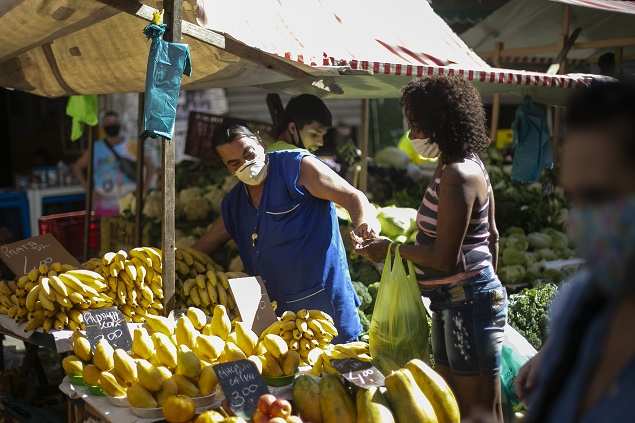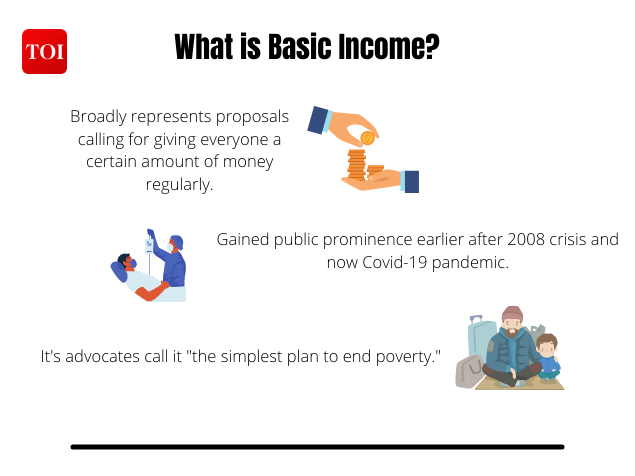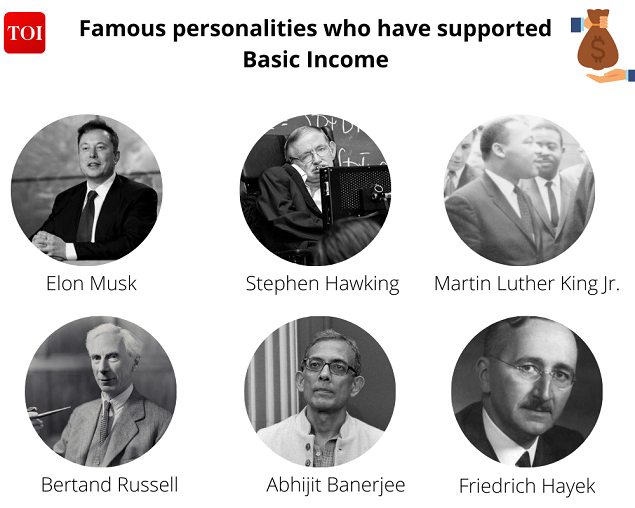Scott Santens is a US-based researcher and writer who calls himself a “full-time advocate of unconditional basic income.” His work has been featured on World Economic Forum, Politico, The Huffington Post and many other platforms. In a conversation with TOI, Santens tells us about the history of the idea, why it is better than targeted income approach and his own experience of living with a basic income. For many Universal Basic Income is a new idea that has just made its way to the mainstream. However, it isn’t so. Could you tell us a bit about the history of the idea?Yes, it’s not new. We can go all the way back to Thomas More. In the US, Thomas Paine [in late 1700s] had a plan where every American would have received a large cash grant at the age of 21. And that would have been considered natural inheritance, and it would be funded by a tax on people’s inheritance.
The first real, fully universal, monthly cash kind of plan was, I think, proposed in 1918, by a couple of Quakers.
And then when we got into the ’60s and ’70s, that was when the idea of guaranteeing an income really spiked setting in the US and elsewhere, too.
That was when Martin Luther King Jr was talking about it. And Milton Friedman [Nobel-winning economist] also was talking about this, he called it a negative income tax.
[Richard] Nixon proposed a negative income tax for families in 1969, and it passed the House of Representatives in 1771. It did not make it through the Senate.
So after the ’70s, it [UBI] just kind of died off. People really started talking about it again, after the 2008 Great Recession. Everyone was talking about inequality and solutions to this inequality crisis
And then a couple years after that Europe did their first EU-wide signature initiative for universal basic income. And that requires a certain amount of signatures from each nation in the EU. So people started learning about UBI, really, for the first time in Europe.
The signature initiative did not succeed, But it still took the idea to a lot of people who would not have otherwise known about this. And then that led to Switzerland’s referendum which started the global discussion on a much bigger level.
Even though Switzerland rejected the idea, in the process again, many people all over the world learned about it.
I’m curious about your journey into UBI advocacy. How did that come about?
In 2013, a discussion hit the front page of Reddit where they were talking about how quickly technology is advancing and no one’s talking about it.
So in that discussion thread I learned things that I didn’t know already about the state of automation.
And there was a book that was recommended by a bunch of people in that thread called ‘Manna’, by Marshall Brain.
There’s this AI [in the book] that works on automating things that can be easily replaced. So he replaces the middle management.
Someone gets fired from their job by this software, because it has determined that, let’s say, they’re late to work three times in a row and it’s a three strikes out kind of thing. So then the software is also utilized by all these other companies to do their hiring. It’s not not just hiring, it’s doing the firing.
So then why would you hire this person that you already fired somewhere else? So as you’re also automating, you’re making people non-hireable. And so what do you do with them? Well, according to our current logic, you just make sure that they have food and housing and that’s it. So you can imagine these big compounds full of people who are just unemployable.
And and so the other part of the book is saying, well, you know, let’s imagine that we actually utilise technology for the benefit of everybody. It’s like more of a Star Trek kind of take. If there’s abundance through technology, then let’s make sure that everyone has access to that abundance.
So how do we make technology benefit everybody? The author’s take was that you start with a high basic income. You make sure you have that floor, so that the revenue from all the automation is flowing to everybody as an absolute minimum. They can still earn more on top of that. if you can’t find a job, you’ve got that floor, but you’ve also got the floor to create your own job to go between jobs or to work less instead.
So putting all the philosophies and studies together, it just painted a very clear picture to me that that UBI is something that would just have a really huge positive difference as far as going from dystopia to utopia. And that’s what I’d much prefer (laughs).
You say you have also crowdfunded your own basic income. How has that experience been for you?
I started that in 2014. It took all of 2015 to increase my crowdfund from the 0 to $1,000 per month, and then starting in 2016, started [getting] over $1,000 every month. And so now I’ve, I’ve been living with a basic income since 2016.
And thanks to that floor, I’m able to actually do the work that I want to do. And that’s largely writing, researching and doing podcasts, and just doing everything I can, to build this movement.
The thing I learnt that I thought was profound, right off the bat was that I started to feel a difference. Even when I just had like, $300 per month. It’s really just enough to make sure that your food is covered. I think that there was a sense of security from it that I hadn’t really felt before. Just knowing that it’s going to be there next month really takes the edge off.
The power of it is through like that unconditionality – that it’s going to be there.
That creates this sense of security, that reduces stress and, and enables you to I guess think better.
And I’d read arguments, you know, as security being, like, a big reason why UBI is the most important, but didn’t really understand it and didn’t really feel that argument until I felt security afterwards.
Another thing that I’ve learned from it, is that I really have this self-directed time. I can do what I feel is important. And, because of that I can refuse things that I feel are not important. And I can also refuse, say, you know, payments that I feel are too low.
If someone wants me to write something for them, earlier I would have accepted $50. But now, if I’m gonna spend that kind of time and research to write something, I don’t think that’s enough. And so I feel comfortable saying I’m not going to do it for $50. I’ll do it for $500 or something.
And then they can either accept it, or it won’t be written, or also decide to do it for free.
I’ve learnt that I’m actually much happier writing things for free and putting it out there with no paywall, and everyone can read it and they can even reprint it and translate it and share it. I don’t care about earning income from it, because I have my income that’s guaranteed.
So, other than the security factor that you mentioned, what have been the other key findings in your research?
There’s so many things… I would say like, first of all, is health.
You can see that a lot of what we treat medically, is actually like a lack of income when it was needed, and like a lack of stability and a lack of security. So you know, people are living with chronic stress and living with poverty, and then we end up treating it on the back end.
So if you make sure that people have enough income to not live in poverty, that you make sure that the income is stable, so that people aren’t stressed out about it, that you can actually prevent a lot of this disease, for a lot cheaper. It’s so much cheaper to be spending, you know, $1,000 a month on somebody, instead of treating them years later for like, you know, millions of dollars worth heart surgeries or whatever. So that’s one big thing.
And the evidence from the Dauphin experiment was that there was an 8.5% reduction in hospitalizations. As one researcher said, ‘If we found a drug that we could put in the water that reduces hospitalizations, by 8.5%, we would absolutely do it (laughs)’. And so, basic income can be thought of as a social vaccine.
So you could vaccinate people against poverty and chronic stress insecurity in a big way and just save so much money in the healthcare system.

UBI proponents say, many businesses fail, not because the idea was bad but because people just didn’t have the money to actually be customers at the businesses.
Another thing that I see over and over again, is that there’s a big increase in self-employment and entrepreneurship.
Like big ones in Namibia, the increase was 301%. And in the India experiment, the experimental villages were three times as likely, or had three times as much entrepreneurship as the controlled villages.
There’s a lack of capital, so that people don’t have [money] even though they have these ideas to start their own businesses, And also, another part of it is that there’s risk aversion. If you fail at your business startup, then, without a basic income, you and your entire family can fall into poverty. So a lot of people aren’t taking those risks out of fear of what happens if there’s failure.
UBI takes that risk away.
And then the third part of it, too, is that so many businesses fail, not because the idea was bad. But because people just didn’t have the money to actually be customers at the businesses.
One of the people in the Namibia experiment I thought really showed this well.
With her first payment, she went out and bought a bunch of yeast and flour, and she built a makeshift oven. And she started making these little cakes for her village. And it succeeded to the point where at the end of the experiment, she was actually making, I think, like three times more than the basic income in itself, from her business. And it was because everyone in her village actually could afford to be customers, because they now had the money to be customers.
[Without UBI] there wouldn’t have been those customers in the village. So it’s unlikely that she would have succeeded to the degree that she did.
Another one that I think is big is trust that came out in the Finland experiment with basic income. One of the surprising findings was that trust increased. So trust increased in politicians, in institutions, and in overall society.
It [basic income] is a display of trust in you. The government is saying, here’s money, you can do anything you want with it, you don’t need to prove anything to me. I trust you. And in return you feel trusted. So you trust others now more than you would otherwise. And I think like part of the problem all over the world is this lack of trust
Why is the targeting approach, of setting aside benefits and money for people who need it the most, not a good enough approach for you?
As soon as you set up that [exclusionary] line you’re always going to exclude people on the other side of that line. It’s better to get and not need than to need and not get.
We’re in a pandemic, and you really want to make sure that everyone who has lost income [gets some help]. As soon as you introduce the Means test, you’re not gonna find them. And especially when that Means test is using old data.
So it just makes more sense to say, let’s not worry about varying the amount of income on the front end, let’s just worry about taxing appropriately on the back end. So instead of saying that someone earning over $100,000 shouldn’t get the income, you say, well next year, when they do taxes, those who earned over $100,000 in 2021 will see a increase in their taxes so that the income that they received is essentially clawed back from them so they’re not a net recipient of it.
And so that’s one reason for universality. But you know, another reason is, is also just the fact that you create a stronger programme when it’s universal. The more people who receive it, the more people are going to be supportive of the policy.
There’s a lot of stigma attached to poverty alleviation programmes…
Right. So that stigma will mean that people purposely don’t apply for the programme even though they should. And also, people are upset at those people for receiving it. And they treat them poorly. And then those people who are receiving it feel poor about receiving it.
Also it’s much easier politically to demonize that and say ‘these people are taking your tax money and we should end these programmes because they’re just a bunch of leeches and stuff.
Whereas if you had a fully universal programme, you just won’t see that.
With the pandemic, many were expecting that Covid would lead to a greater or a faster approval of the basic income idea but it hasn’t been the case. Why hasn’t it happened?
We’re fighting an entrenchment of belief. And it’s just that it can’t be done, instantaneously.
Even though there’s a huge new pressure because of the pandemic, it still takes time to move the ship from the direction that it’s been going. So I’m still hopeful. And, and there’s definitely improvements happening in the direction of UBI. A child allowance is going to most likely happen here in the US and that’s something I’ve been pushing for years.

Brazil passed a Basic Income law in 2004 and it could very well be the first country to have a universal basic income in the future. (Image courtesy: Getty)
At some point, there’s going to be a country that’s actually a bigger country that will do this, where it’s like, well, let’s just make it universal and monthly. They don’t have to be big, you know, it could just be $200 per month.
Another thing about why things are going slowly. It’s because so much labour in our society is done because people feel that they have to do it in order to earn income. If they don’t do it, they’ll starve. if they don’t do what people who have the money want them to do, then they will have nothing. And so something is better than nothing. So we’ll do it.
So a lack of UBI keeps prices low and keeps people coerced into labor that they wouldn’t otherwise do at prices they wouldn’t otherwise accept.
This was something that was asked in the in Switzerland debate too when it was voting on this. And I remember one of the stories that came out of this was in one of the town halls where discussion was happening on this, someone asked, “What would happen to our maid?” They were worried that their maid would start receiving the basic income and then quit being the maid. And so that was like the first concern – well, who will keep my house clean?(laughs)
Is there any particular country you think the world should keep an eye for, which you feel could give the movement for basic income a big push?
Brazil is the first and only country to have actually passed basic income. It’s actually a law as of 2004. And the small print of that law says that it needs to be executed by the executive. So the president is the one to decide to implement basic income.
Since that law has been put into place, no president has said, let’s put it into practice.
During the pandemic [President Jair] Bolsonaro did provide a lot of money to people directly. And that increased his popularity. It could lead to Brazil being among the first to do it. So, eyes on on Brazil.
Elsewhere, Spain caused a big hubbub because they decided to do a minimum income guarantee permanently as a result of the pandemic. So that’s not UBI. It is Means tested. But still, they went from not having an income guarantee to having one.
Japan is looking good, because they did a full universal amount there as again, one-offs.
Also Canada has been doing their $2,000 a month, and it’s been targeted to those who’ve lost employment during the pandemic. There’s been a lot more push among politicians there in Canada. And I am still hoping for India as well.
I think that China is always a possibility as well, because again, China can just decide to do it. You know, there’s no democracy there. So at any point, China could be like, this is gonna increase our GDP, this is going to, really help us. Instead of relying so much on other people to consume their goods, they can consume their own goods, if they just made sure that everyone had UBI.




